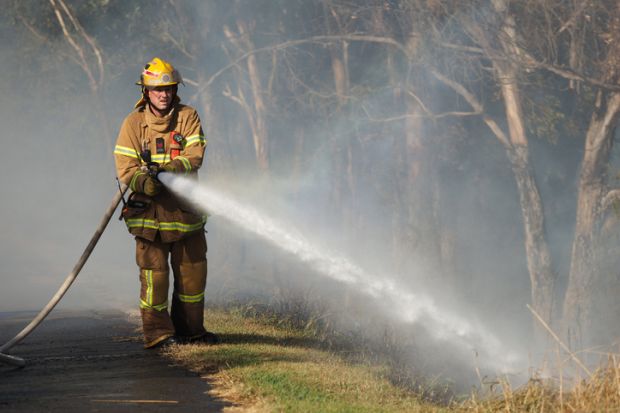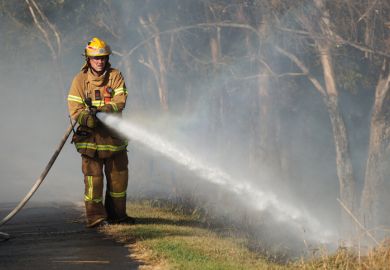Australia’s international education representative body is vowing to curb its carbon emissions, as the bushfire emergency elevates climate consciousness across the scorched country.
The International Education Association of Australia is developing a carbon neutral policy to mitigate the climate impacts of globetrotting education leaders. Meanwhile the leading university body is joining education minister Dan Tehan’s crisis meeting on the bushfires.
Mr Tehan said Prime Minister Scott Morrison had asked him to call the meeting of the sector’s representatives “to hear first-hand how the bushfires have impacted education, and how our government can help”.
The summit, scheduled for 15 January, echoes similar forums of key players in other sectors. It will focus primarily on schools and childcare centres, where the summer break ends much earlier than at universities.
But Universities Australia chief executive Catriona Jackson said the meeting offered an opportunity to thrash out how her members could continue supporting affected communities.
“University expertise is being deployed to help the community make sense of the crisis, across almost every aspect,” she said.
Ms Jackson highlighted the need for clear communication with international students during the crisis. She said students heading for Australia should contact their prospective universities if they had queries or concerns, while those already in the country should “reach out to university support services if they feel distressed or anxious”.
The support has not all been one-way, with international students among those contributing to the relief effort. International media has carried a story about Mark Yeong, a Singaporean student at the University of Sydney who joined a volunteer firefighting brigade.
International education representatives from Australia’s eight states and territories are also putting together a joint statement on the bushfire emergency, in collaboration with the education and trade departments and IEAA.
Its primary focus is ensuring the safety of current and incoming foreign students, in line with provisions outlined in a “collaborative marketing framework” developed a year ago by the Council for International Education, which is convened by IEAA chief executive Phil Honeywood.
The provisions are designed to coordinate the sector’s responses to critical incidents, and to ensure that jurisdictions do not profit from each other’s misfortunes in situations like the bushfire crisis.
Mr Honeywood said the disaster had also presented an “appropriate time to have a comprehensive look at the carbon footprint situation and to lead by example”. He said that given their considerable domestic and overseas travel, international education representatives needed to find ways to alleviate the climate impact.
This included encouraging webinars and teleconferences as an alternative to international travel. When flying became unavoidable, education representatives should support measures offered by airlines to mitigate the carbon footprint, such as paying for trees to be planted.
He said the industry should also look at ways of reducing the far greater carbon footprint generated by the international travel of students themselves. An obvious measure was to put more resources into branch campuses rather than focusing on onshore recruitment.
“Australia has not been very good on transnational education,” he said. “Surely it’s part of our mission as a sector to be more accessible to the largest number of students possible...to provide world class education in countries where it’s not readily available.”
He said the policy was expected to be approved by the end of February.
Register to continue
Why register?
- Registration is free and only takes a moment
- Once registered, you can read 3 articles a month
- Sign up for our newsletter
Subscribe
Or subscribe for unlimited access to:
- Unlimited access to news, views, insights & reviews
- Digital editions
- Digital access to THE’s university and college rankings analysis
Already registered or a current subscriber?








